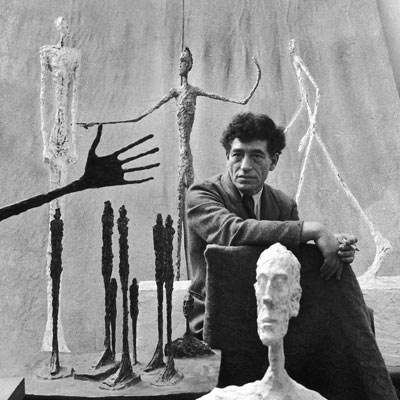
10/10/1901 – 11/01/1966
Alberto Giacometti, born in 1901 in Borgonovo, Switzerland, and passed away in 1966 in Chur, Switzerland, was a world-renowned sculptor, painter, and draftsman. He is famous for his slender, elongated sculptures that express the fragility and isolation of human existence. Giacometti quickly established himself as an iconic figure in modern art thanks to his unique style and profound exploration of the human condition.
He began his artistic training at the School of Fine Arts in Geneva, then in Paris under the direction of Antoine Bourdelle, a disciple of Rodin. In Paris, he was influenced by avant-garde artistic movements, particularly Surrealism. However, he soon distanced himself from Surrealism to develop his own artistic language.
Giacometti is best known for his characteristic sculptures of elongated, stripped-down human figures, such as “The Walking Man” and “Standing Woman.” These works, often in bronze, are marked by their rough texture and eroded appearance, reflecting an incessant quest to represent the reality of human existence in all its complexity and vulnerability.
His work is distinguished by an intense exploration of space and perception. Giacometti often stated that his sculptures were attempts to capture the vision he had of his models when observing them from a distance. This concern with perspective and proportion led to works where the figures seem both close and distant, embodying a sense of isolation and loneliness.
In addition to his sculptures, Giacometti produced numerous drawings and paintings, often portraits of his close friends and family. His drawings are also characteristic of his style, with fluid lines and minimalist compositions that highlight the human figure in a minimalistic space.
Giacometti received numerous accolades throughout his career and was widely exhibited in museums and galleries around the world. His influence on contemporary art is immense, and his work continues to be studied and admired for its emotional depth and technical mastery.
